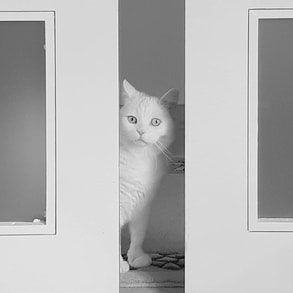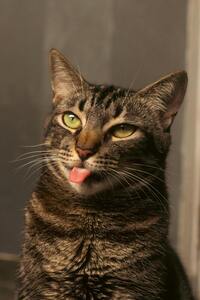 Photo by Omer Unlu
Photo by Omer Unlu Is your favorite feline fond of “guarding” your door – whether bathroom or bedroom -- when you close it behind you? Have you ever wondered why? If so, consider the paws-ible explanations below.
1. Your cat yearns for attention: By “guarding” the door, her persistent presence is, more often than not, a clear call for attention. If she’s meowing loudly and/or pawing at the opposite side of the door, her message is an even more emphatic one.
2. Your cat is curious: Inquisitive by nature, a trait that once helped her ancestors survive in the wild, your cat, especially a new one, is no different. By understanding more about her “world,” she’s differentiating between safe and unsafe spots and learning to feel certain in her space. A closed door, therefore, merits further investigation if she’s still accustoming herself to each room, leading her to linger outside until she’s able to enter it.
3. Your cat is protecting you: Despite their reputation for being solitary creatures, cats, when part of a group, not only cooperate with each other but protect one another. What could be more natural then, than you and your kitty forming your own little group? You’re now the one she’s determined to protect, typically using her vocalizations as her signal that she’s on the alert for what she perceives as threats. “Guarding” your door may simply be another way of her trying to keep you safe.
4. It’s become a habit: If your cat sits there long enough, often enough, she’ll become accustomed to “guarding” your door. Using the bathroom at the same times every day or going to bed at the same time every night is an invitation for her to stay outside either one or both doors. Then, once it’s part of her own routine, she’ll maintain it because she enjoys the familiarity and predictability of it.
5. Your cat is extremely attached to you: If you’re highly invested emotionally in your cat, and have formed a “mutual admiration society” of two, the bond you share is as deep as it is precious. For her, this attachment signifies security and comfort, offering her a safe haven from which to explore the rest of her environment. Is it any wonder then, that, in her desire to be near you, she’ll “guard” any door that separates the two of you.
6. Your cat is territorial: Cats are famous for being territorial and will often exhibit aggressive behaviors when they feel threatened. Introducing a new cat into your household disrupts an already established routine and balance, often resulting in a competition over resources. For example, your current cat might block the new one’s access to food and water bowls, sleeping spots and/or litter boxes. And if there’s a door standing between them and something they both want -- namely, you -- one may begin “guarding” that door to keep the other cat out.
If, however, your cat is “guarding” the door due to separation anxiety, reduce her stress level by providing her with several cozy spots to rest coupled with a tempting assortment of toys and enrichment devices – from puzzle games to cat tunnels and various forms of cat scratchers.










 RSS Feed
RSS Feed